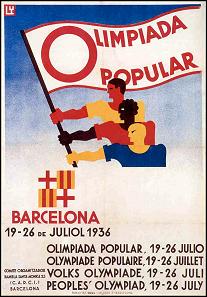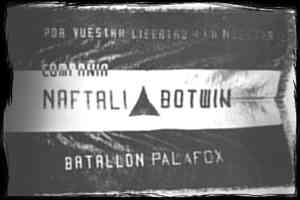Volunteers in the Spanish Civil War saw the conflict as an opportunity to fight against international oppression. “For the first time since Fascism began systematically throttling and rending all we hold dear,” wrote Gene Wolman, a volunteer from New York, “we are getting the opportunity to fight back.” For Jews, the Fascist menace embodied both political oppression and racist anti-Semitism. In 1939, as part of his testimony before a the Dies Committee set up by the US Congress to investigate so-called un-American organizations, Milton Wolff said, in explaining why he enlisted in the Spanish Civil War: “I am Jewish, and knowing that as a Jew we are the first to suffer when fascism does come, I went to Spain to fight against it.”
The International Brigades became the vehicle through which Jews from all over the world could confront this raging enemy. “Here, finally,” said Wolman, “the oppressed of the Earth are united, here finally we have weapons, here we can fight back. Here, even if we lose, in the fight itself, in the weakening of Fascism, we will have won.”
 Even before the formation of the International brigades, Jews were among the first to take up arms in Spain. Among them were many who had fled Germany when Hitler rose to power and had been welcomed by the Republican government, as well as members of athletic groups who had arrived from various countries to take part in the People’s Olympics scheduled to begin in Barcelona in mid-July 1936. The People’s Olympics had been organized to protest against the World Olympics scheduled for August in Hitler’s Berlin.
Even before the formation of the International brigades, Jews were among the first to take up arms in Spain. Among them were many who had fled Germany when Hitler rose to power and had been welcomed by the Republican government, as well as members of athletic groups who had arrived from various countries to take part in the People’s Olympics scheduled to begin in Barcelona in mid-July 1936. The People’s Olympics had been organized to protest against the World Olympics scheduled for August in Hitler’s Berlin.
The earliest foreign volunteers to fight against the Franco uprising joined Spanish units or formed small columns that spoke the same language. As the number of foreign volunteers increased in the autumn of 1936, they organized separate brigades, continuing the practice of consolidating volunteers who spoke the same language. Anti-Hitler Germans formed the Thaelman Brigade; anti-Mussolini Italians formed the Garibaldi Brigade; French volunteers formed the “Commune de Paris.”
Within the International brigades there was a high proportion of Jews among the volunteers from many countries including Poland, France, Britain, Germany, Canada, and Palestine. Among the medical personnel who went to Spain from many countries, by some estimates 70% were Jews and accordingly the Yiddish language was often used in the operating rooms as a common language to overcome national differences. The largest number of Jews in Spain came from Poland; US Jews were the second largest contingent.
Of the approximately 3,000 volunteers from the United States who formed the Abraham Lincoln Brigade, some estimates suggest that one-third were Jewish. Many were children of European immigrants, who had arrived in the U.S. during the early years of the century. They had received an “Americanized” education in school, but still felt family ties to Europe. Most volunteers came from large cities, where immigrants had settled. In addition, two-thirds of the volunteers were Communists. But many Jews were not Communists and went to Spain to fight back against Nazis and fascists. “I am as good [an] antifascist as any Communist,” wrote one volunteer to his commissar. “I have reason to be. I am a Jew and that is the reason I came to Spain. I know what it means to my people if fascism should win. (And I know they won’t.)”
Hyman Katz was one volunteer from New York. He went to Spain without telling his mother because he did not want to upset her. But when he was wounded in action in 1937, the young volunteer decided to explain to his mother why he had enlisted against her wishes. His letter home reveals the motives of many other Jewish volunteers. “Don’t you realize that we Jews will be the first to suffer if fascism comes?” Among the US volunteers was Samuel Levinger of Columbus, Ohio, who was the son of a rabbi. He was killed at Brunete in July 1937. His father, Rabbi Lee J. Levinger remained a loyal friend of the Lincoln Brigade. Many Jewish women, including Esther Silverstein, also volunteered to serve as nurses as part of the American Medical Bureau to Save Spanish Democracy.
The high percentage of Jews among the antifascist volunteers prompted the leadership of the International Brigades to consider forming an all-Jewish brigade. The purpose of this unit was to express the direct participation of Jews alongside other national groups in the fight against Fascism. High casualties made this impossible, but a Jewish company was formed within the Polish Dombrowski brigade, named after Naftali Botwin a Communist martyr of the Polish-Jewish labor movement. Embroidered on the company’s flag in Spanish, Polish and Yiddish was its motto “For your liberty and ours”
 Members of the Botwin Company included Jews from Poland, various European countries, and Palestine, but also a Greek, two Palestinian Arabs and a German who after deserting from the Nazi army insisted on serving with this Jewish unit. Yiddish language publications Der Fraihaits-Kempfer and Botwin were also published for all the Jewish volunteers scattered among the various national units.
Members of the Botwin Company included Jews from Poland, various European countries, and Palestine, but also a Greek, two Palestinian Arabs and a German who after deserting from the Nazi army insisted on serving with this Jewish unit. Yiddish language publications Der Fraihaits-Kempfer and Botwin were also published for all the Jewish volunteers scattered among the various national units.